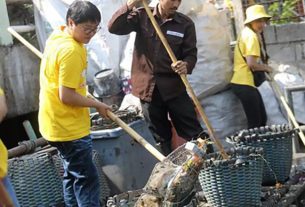NGOs campaign to defer dams construction in Lower Mekong Basin
Campaigners on Tuesday expressed concern against the members from the
In an interview with reporter in
He gave the remark as several civil and environmental groups, including International Rivers, Probe International and World Wildlife Fund gathered together in Bangkok and called on the MRC to live up to its mandate to protect the Mekong River.
International Rivers, a U.S.-based NGO, seeks to protect rivers and defend the rights of communities that depend on them, Carl said.
Carl said the MRC, which comprises
The
“Any dam built on downstream sections would cause dramatic changes to the river. By blocking vital fish migration routes and sediment flows, the dams will significantly alter the river’s rich biodiversity,” said Carl, “this will result in fishery losses, impacting the livelihoods and food security of millions.”
Experts have repeatedly warned that any
It is estimated that the
“All impacts are incremental,” said Marc Goichot, Sustainable Infrastructure Senior Advisor to the World Wildlife Fund’s Greater Mekong Program.
Source: Xinhua

